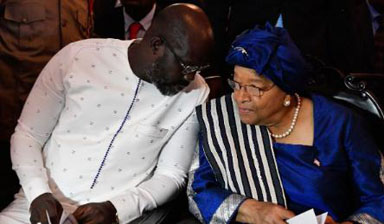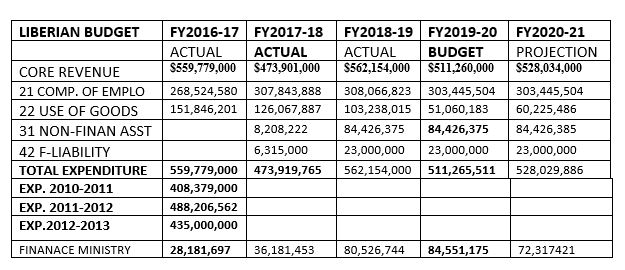Liberia’s Cash Shortfall $355m: Number Game By Presidents Sirleaf & Weah
By J. Yanqui Zaza
The Perspective
Atlanta, Georgia
August 23, 2019
 |
|---|
| Passing on the corruption legacy |
The May 16, 2019 Report of the International Monetary Fund Country # 19/169 stated that Central Bank of Liberia’s claims in US currency on Liberia has increased to US $355M in 2018 from US $260M in 2016. This is part of the reason why President George Weah Administration is finding it difficult to pay bills, pay for fuel oil for government offices, clinics, etc.?
Is the cash shortfall due to corruption? Or, did government overestimate revenue projection, and cannot print new banknotes and/or get cash from the sales of bonds? Or, is Liberia cash trapped because of the “deceptive” economic arrangements?” For this article, let us review the use of “deception” and the “number game.”
Deception of “give away revenue.” (1) Although private-investors usually remit minuscule taxes, former President Ellen Johnson Sirleaf awarded 66 fraudulent concessionary agreements to private-investors based on the promise that they are prudent managers. Liberia’s economic system generates about 3% revenue from diamonds, etc., while a country such as Botswana’s economic system generates about 50% of revenue.
(2) Deception of unnecessary expenses: Public records indicate that excessive salary, especially for selected advisers, does not only reduce the government’s cash, but it also breeds corruption. Yet former President Ellen Johnson Sirleaf paid excessive salary based on the promise that bonus discourages advisers from demanding bribes in exchange of favors. The practice did not only increase corruption, but it also compelled Liberian Lawmakers to demand higher salaries.
(3) “Deceptive budgetary numbers:” Why did former President administration not include all estimated cash within the budgetary document? For example, the government did not include the value of the new banknotes printed to support the budgets; neither did government include the proceeds of bonds sold in 2015 through 2017 or neither did Sirleaf administration include within the budgetary document the US $13M donation from the European Community.
Deception is not new, and mankind will continue to use it. For example, The NY Times magazine “1619 Project” states if Americans (colonists) were convinced that Britain would not abolish slavery, thereby allowing Americans to maintain their cash-producing properties (slavery), they would not have revolted against Britain. The Times also added, President Abraham Lincoln, was not ready to accept Blacks equality, but he lured and convinced them into the war because he was aware that Britain sided with the Confederates and Unionist-Whites were reluctant to fight in the war.
 |
|---|
The “number game” is another method of deception. An economist, describing chief executives’ use of the number game, stated that “…there are two basic ways to increase a company's earnings: increase revenues or decrease expenses…” and “…some CEOs and CFOs don’t stop at the red lights,” until they increase profits.
Before we review the schedule, remember, governments spend a significant portion of their revenue on the wage bill, massive buildings (i.e., Hotel of Africa in Liberia), etc. Therefore, when money lending institutions want poor countries to borrow more loans, they entice bureaucrats, to undertake massive projects or pay excessive allowances.
So, it was not a surprise why Liberia’s wage bill is 60.3% of the total expenditure, according to page # V of the 2018-2019 Budgetary document. Liberia is not alone, according to Mr. Benson Okundi, CPA. He stated that 41poor countries spent on the average 30.4 percent of their budget on wages, while 27 European countries spent 15.9 percent on wages. And Liberia’s wage bill, like any other wage bill, which is difficult to postpone, and usually eats up a higher percent of the budget, has contributed to Liberia’s negative cash to US $355M in 2018.
It is true wage bill increases cash shortfalls, but a fair and a reliable revenue projection can minimize cash shortage. Guided by deceptive attitude, Liberia’s leaders have and continue to use “false budgetary numbers” and cover-up cash shortfalls. From the onset, former President announced that investors had agreed to invest $10B in Liberia, thinking that a reasonable amount would not attract investors. Additionally, the Sirleaf Administration increased the 2005/2006 budget from $80M to $150M for FY 2006/2007, without providing information.
At the end of her twelve years, she stated Liberia’s International Foreign Exchange Reserves had $154M, even though the Central Bank of Liberia (CBL) reported that the country owed $132M. If her administration could mislead Liberians about the country’s cash shortage, should Liberians believe that her administration did not use cash of state-owned entities? Or, why did her administration fail to allow state-owned entities to publish financial statements? Should Liberians believe that her administration did use a portion of the US $80M cash of NASSCORP since she blatantly violated international and bilateral money management principles and used $13M from the European Community and coverup Liberia’s cash shortfalls?
The incoming President Weah stated that the country was broke during his inaugural speech on January 22, 2018. Predictably, based on the economic crisis, he could not sell bonds, print new banknotes nor rely on the cash from state-owned entities. So, one wonders why his administration projected high revenue US $562M and US $511M in FY2018-19 and FY2019-2020 respectively than the US $473M revenue in FY2017-18?
Further, why did the administration not use the US $100M saved from the Budget item # 22 (Use for Commodity and Services) to coverup money for Budget item # 21 (Compensation)? The administration reduced Budget item # 22 from US $151M in FY2016-2017 to US $51M in FY2019-2020. Good savings, but it reallocated a portion of the US $100M to the Ministry of Finance, Planning, Development, and Economic Affairs. It gave no reason (i.e., economic factors) why it increased the appropriation to US $84M in FY2018-2019 and FY2019-20 respectively, from the US $36M appropriated in FY2016-2017.
Most importantly, how can the administration state that Liberia’s economic activities are declining, but at the same time projects revenue that indicates otherwise. Also, it could have reduced the expenditure by not reallocating the US $100M, but its revenue projection would have to be reduced. Guess what, in the “Number Game, an institution or country appears to look good, even when estimated amounts are not realizable.
Unfortunately, managing cash becomes difficult because other parties rely on and use the deceptive estimated numbers.
References
liberia_2012_approval_external...pdf (15.5 MB)
National Budget FY2017-2018 co...pdf (15.4 MB)
Annual_Report_2018_Feb_12_2019... (2.0 MB)
draft budget book fy2018-21 co...pdf (7.1 MB)
Draft National Budget FY2019-2...pdf (17.6 MB)
file:///Users/mac/Desktop/Untitled%20CD%2010.fpbf/National_Budget+FY2017-18%20copy.pdf
cr18172.pdf (10.0 MB)